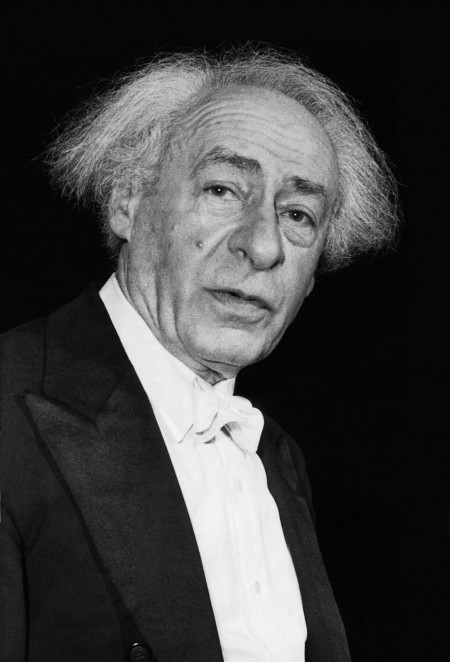
9 April 1891, Budapest – 25 March 1977, Düsseldorf
From a letter of Bartók from Frankfurt am Main: ‘...what a bad opera messes up my works here. I am facing a mournful premiere. [...] There is one person who worth something here, and that is Szenkár from Budapest.' (May 9, 1922) Jenő Szenkár was a son of a musician family; his father was choral conductor, leader of the choir of the Hebrew Community in Budapest, his younger brothers, Dezső and Mihály were also a conductor and a composer, respectively.
He was a student of Viktor Herzfeld at the Academy of Music between 1908 and 1911. According to lexicons he might have been a coach at the Opera in 1911/1912, though the literature of the theater does not mention his name. One year later he was a conductor of the Landestheater in Prague, and of the Népopera (today Erkel Theatre) between 1913 and 1915. He worked at the Mozarteum, Salzburg; at the great opera ensemble in Altenburg and at the Opera in Frankfurt am Main. He was the director of the Volksoper in Berlin in the 1923/1924 season and music director of the Opera in Cologne between 1924 and 1933. A typical Hungarian conductor career from the first decade of the century, when those who could not prevail at the narrow Hungarian musical life, tried their fortune at German-speaking territory.
He wrote the important chapters of Hungarian music history in Europe and overseas, whereas he basically had no connection with the musical life of his native country from 1915 (the Philharmonics invited him for one concert in 1925 – he premiered the Pulcinella Suite by Stravinsky – ‘next time' he conducted at the Bartók Festival of 1956).
His merits are everlasting at the international introduction of the stage works of Bartók and Kodály. He conducted the international premiere of the Bluebeard's Castle and the Wooden Prince (Frankfurt am Main, May 13, 1922) after the premiere in Budapest. Szenkár was the conductor of the second international premiere of the dance play, as well, at the summer of 1923 when the festival of the Hellerau Dance and Movement School founded by Jaques-Dalcroze programmed it, the director of the school happened to be the Hungarian Ernst Ferand (alias Ernő Freund, a piano teacher of the Fodor Music School).
Jenő Szenkár conducted the scenic premiere of the Háry János by Kodály abroad (Cologne, September 26, 1931). He most likely introduced the music of Kodály at South America (Háry János Suite, 1928; Psalmus Hungaricus, 1932; Dances of Marosszék, 1934, all in Buenos Aires). I write ‘most likely' because that is hard to overview the musical life of the huge continent.
The peak of his life achievement as a conductor was the premiere of the Miraculous Mandarin (Cologne, November 27, 1926). It survived only one performance, the work was swept away by the protest of the mostly conservative audience - which turned into assault – against the composition, the general director who modernized the repertoire of the opera, and against the artistic program of the intendant, Hans Strohbach (director-stage manager). The scandal in Cologne ending with prohibition had long lasting consequences regarding the repeated wrecking of the premiere of the Mandarin in Hungary. The complete satisfaction of the composer who was extremely critical to his performers indicates best the value of the accomplishment of Szenkár.
The career of Jenő Szenkár was raising; the Odeon signed him for a recording (Beethoven's Fifth symphony with the orchestra of the Berlin State Opera) but the Nazis expelled him, similarly to many of his colleagues in 1933. He emigrated to Moscow and became the leading conductor of the Philharmonic. This was not political but an existential decision. Thousands of musicians became outlaw in 1933 in Germany and they were glad to work anywhere in the world. In 1937, the year of the purges, all the spy-suspect guest workers were expelled from the Soviet Union.
We know little about those years of Szenkár. He premiered the Russian Overture by Prokofiev, arranged for small orchestra in 1936/1937; and the suite version of the ballet music of Romeo and Juliet at the same evening as the premiere of the Lyric Suite by Ferenc Szabó. He was a friend of Prokofiev: Szenkár conducted the first successful operatic performance of The Love for Three Oranges at the presence of the composer (Cologne, 1925).
Following an interlude in Cairo, Rio de Janeiro became his home for ten years, in 1939 and he founded the Brazilian National Orchestra. He worked at German territory in the FRG from 1950, at the Düsseldorf Opera at last.
At the legendary Bartók Festival in 1956 he conducted the State Concert Orchestra at his full power (Egmont Overture, Bartók's Violin Concerto with Ede Zathureczky, Liszt Faust Symphony); he was the partner of Annie Fischer two years later (Third Piano Concerto of Bartók). I heard three further concerts of the highly experienced, knowledgeable small master, and his conducting of the Salome at the Opera. He visited his native country at last in 1963 at age 72, slightly tired. His illness kept him away from the great Kodály feast in December, 1962 although he was invited to conduct the Psalmus Hungaricus.
B. J.


